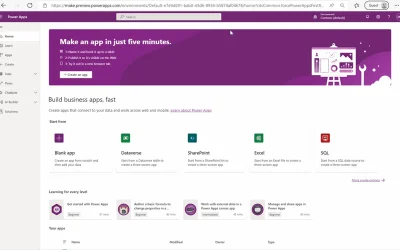Insights
Learn what’s new and read insights about Microsoft Dynamics 365 and the Power Platform.
Unveiling Dynamics 365’s Enhanced Email Timeline Referencing
Explore Dynamics Customer Insights enhanced email timeline referencing. Streamline team communications with full email content visibility.
Dynamics 365 Pricing Increase from October 2024
Detailing pricing changes across Dynamics 365 products from October 2024, including Sales Enterprise and Customer Service Enterprise.
5 Best Practices to Reinforce Security in Dynamics 365 & Power Apps
Elevate security in your Dynamics 365 and Power Apps environments with these 5 best practices for robust data protection.
Enhanced Sequence Preview Now Available in Dynamics 365
Optimise sales workflows with Dynamics 365’s Sequence Preview. Gain complete visibility and foster collaboration for increased efficiency.
Associate Activities with Multiple Records: New Feature Preview
Discover a preview Dataverse feature for linking activities to multiple records in Dynamics 365 and Power Apps.
Power Pages Templates: Simplifying Your Way to a Dynamic Website
Discover examples of Power Pages templates to simplify site development and enhance efficiency with integrated, data-powered websites.
5 Best Practices to Reinforce Security in Dynamics 365 & Power Apps
Elevate security in your Dynamics 365 and Power Apps environments with these 5 best practices for robust data protection.
Planning for Power Platform Data Integration? 8 Essential Questions to Consider
Navigate your data integration journey confidently with our comprehensive guide to eight essential planning considerations.
Best Practices for Dynamics 365 Data Import
Learn how to prepare to ensure data integrity when importing into your Dynamics 365 solution. Discover duplication rules, mapping and more.
17 Power Automate Solutions to Streamline Your Business Processes
Elevate business efficiency and support your growth with Power Automate -where innovation meets practicality.
Unmasking the Simple Truth Behind AI and Automation Choices
Discover practical AI and automation insights for modernising your processes and workflows to increase operational efficiency and growth.
15 Ideas to Level Up Your Dynamics 365 CRM
Elevate your Dynamics 365 CRM system with these user-focused enhancements, data management best practices and features.
Associate Activities with Multiple Records: New Feature Preview
Discover a preview Dataverse feature for linking activities to multiple records in Dynamics 365 and Power Apps.
What’s New in Microsoft Dynamics 365 Customer Service for 2024
Highlights of the latest features and upcoming enhancements for Microsoft Dynamics 365 Customer Service.
What’s New in Microsoft Power Pages for 2024
Discover the latest Power Pages 2024 enhancements – empowering seamless, data-rich website creation and management.
How is Microsoft Copilot for Sales Licensed?
Dive into the licensing details of Copilot for Sales. Optimise seller productivity, integrating Microsoft 365 with CRM and seller workflows.
Previewing 2024 Release Wave 1 for Microsoft Dynamics 365 – Sales and Marketing Updates
Our takeaways from the 2024 Release Wave 1 announcements, available for sales and marketing teams in D365 from April.
How Microsoft Copilot Studio Transforms Knowledge Search in Web Portals
Discover how Copilot Studio can enhance portal search experiences by providing accurate, contextual responses to natural language queries.
Power Pages Templates: Simplifying Your Way to a Dynamic Website
Discover examples of Power Pages templates to simplify site development and enhance efficiency with integrated, data-powered websites.
What are Dynamics 365 Portals?
Explore how web portals integrated with Dynamics 365 streamline business operations and enhance engagement.
17 Power Automate Solutions to Streamline Your Business Processes
Elevate business efficiency and support your growth with Power Automate -where innovation meets practicality.
Model-Driven Apps: Unlocking Business Agility in Dynamics 365
Model-Driven apps transform application development, empowering businesses to adapt quickly in today’s fast-paced environment.
What’s New in Microsoft Power Pages for 2024
Discover the latest Power Pages 2024 enhancements – empowering seamless, data-rich website creation and management.
How Microsoft Copilot Studio Transforms Knowledge Search in Web Portals
Discover how Copilot Studio can enhance portal search experiences by providing accurate, contextual responses to natural language queries.
Unveiling Dynamics 365’s Enhanced Email Timeline Referencing
Explore Dynamics Customer Insights enhanced email timeline referencing. Streamline team communications with full email content visibility.
Enhanced Sequence Preview Now Available in Dynamics 365
Optimise sales workflows with Dynamics 365’s Sequence Preview. Gain complete visibility and foster collaboration for increased efficiency.
Associate Activities with Multiple Records: New Feature Preview
Discover a preview Dataverse feature for linking activities to multiple records in Dynamics 365 and Power Apps.
Empowering Dynamics Admins with a New Security Roles Interface
Discover how the latest enhancements to Dynamics 365’s security roles interface transform administration efficiency and data integrity.
What are Dynamics 365 Portals?
Explore how web portals integrated with Dynamics 365 streamline business operations and enhance engagement.
How Microsoft Copilot for Service Transforms Customer Support
Microsoft Copilot helps agents improve service delivery, streamlining communication and enhancing efficiency with innovative, data-driven solutions.
Dynamics 365 Pricing Increase from October 2024
Detailing pricing changes across Dynamics 365 products from October 2024, including Sales Enterprise and Customer Service Enterprise.
How to Licence Microsoft Dynamics 365 Customer Service
Are you overpaying for Dynamics 365 Customer Service licenses? Learn more about the options here.
How is Microsoft Copilot for Sales Licensed?
Dive into the licensing details of Copilot for Sales. Optimise seller productivity, integrating Microsoft 365 with CRM and seller workflows.
Reduce Your Dynamics 365 Storage Costs with Azure Blob Storage
Cut Dynamics 365 storage costs significantly with Azure Blob Storage. Smart, secure, and cost-effective data archiving for your business
Demystifying the Microsoft Data Storage Model
As businesses progress on their digital transformation path and consolidate data from various sources within their organisation, the volume of data...






















